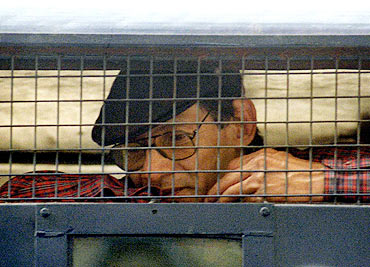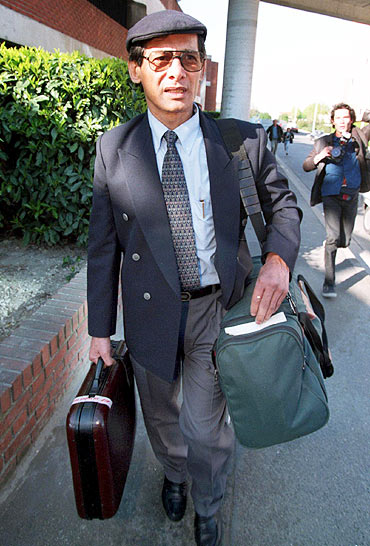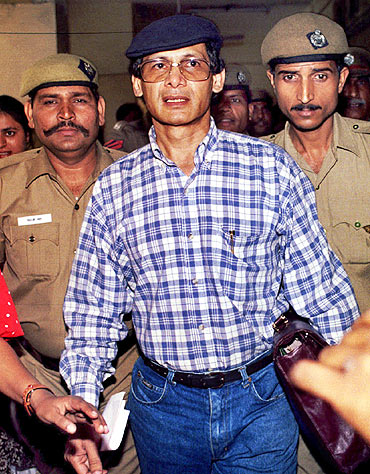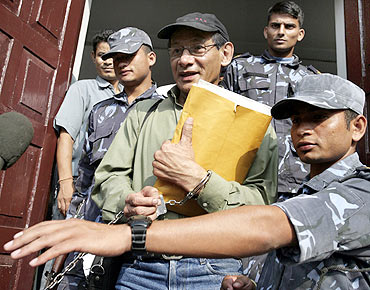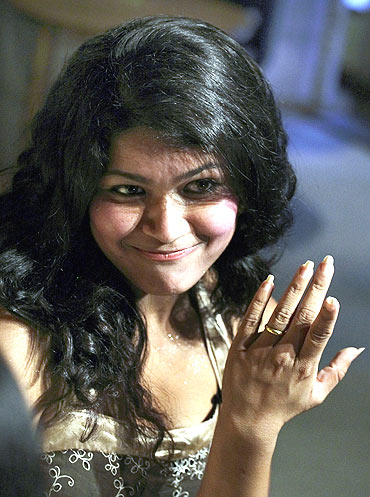 | « Back to article | Print this article |
Bloodstained story of the 'Bikini killer'
Hatchand Bhaonani Gurumukh Charles Sobhraj (born on April 6, 1944), whose life sentence was on Friday last upheld by Nepal's Supreme Court in a 1975 murder case, has spent much of his life in and out of prison for a series of offences.
Nicknamed 'the Serpent' and 'the Bikini killer' for his skill at deception and evasion, he allegedly committed at least 12 murders. He was convicted and jailed in India from 1976 to 1997, but managed to live a life of leisure even in prison. After his release, he retired as a celebrity in Paris; he unexpectedly returned to Nepal, where he was arrested, tried and sentenced to life imprisonment on August 12, 2004.
Born to an unwed Viatnamese mother and an Indian father of Sindhi origin at Ho Chi Minh City (then know as Saigon), Sobhraj had a problematic childhood. Being neglected by his family, he was finally adopted by his mother's new boyfriend, a French lieutenant posted in Indochina, which paved the way for his constant shuttle between France and South East Asia.
Stateless and unwanted, Sobhraj is said to have devised personality disorders from childhood days and turned to petty crimes.
With agency inputs..
Click NEXT to read about his early life..
He turned to crime early
In 1963, at the age of 19, Sobhraj received his first jail sentence for burglary in France. He served three years in Poissy prison in Paris before being paroled. However, not only did he weather the harsh conditions of jail, he managed to manipulate the prison official into granting him special favours like being allowed to keep books in his cell, etc.
Sobhraj was then busy grounding his foot in the high society of Paris and the criminal underworld, and was involved in a number of burglaries and scams. In 1969, he was again sent for 8 months to prison for car theft and evading police in Paris.
Upon release, Sobhraj married his girlfriend Chantal, who belonged to a conservative Parisian family, and soon left France fearing more trouble.
After travelling through Eastern Europe on fake documents and robbing people who befriended them, Sobhaj and Chantal arrived in Bombay in 1970. Here Chantal gave birth to a baby girl, and Sobhraj resumed his criminal lifestyle and started a car theft and smuggling nexus.
An expert in escaping!
In 1973, Sobhraj committed an armed robbery at a jewellery shop in Hotel Ashoka, New Delhi, but was arrested and sent to prison.
However, he escaped from prison faking illness, but was re-captured shortly afterwards. He borrowed money for bail from his father in Saigon and soon after fled to Kabul. The same year, he was arrested there for robbing tourists on the "hippie trail".
But he escaped the same way he had in India. The next two years, Sobhraj was on the run, using as many as 10 stolen passports and visiting several countries in East Europe and the Middle East.
During this time, Chantal, although still loyal to him, wishing to leave their criminal past behind, returned to France and vowed never to see him again.
In 1975, he was joined by his younger brother Andre in Istanbul. The duo quickly became partners in many crimes in both Turkey and Greece. They were eventually arrested in Athens but Sobhraj escaped leaving his brother to serve an 18-year sentence.
He revelled in his notoriety
In 1976, Sobhraj was arrested and sentenced to 12 years of prison term in Delhi for the murder of French tourist Jean-Luc Solomon.
In 1986, he drugged guards with sedative-laced sweets and walked out of New Delhi's high-security Tihar jail.
Sobhraj's systematic bribery of prison guards at Tihar reached outrageous levels. He led a life of luxury inside the jail, with TV, and gourmet food, having befriended both the guards and the prisoners.
Many believe, he would walk in and out of jail whenever he wanted. Revelling in his notoriety, he gave interviews to Western authors and journalists. He freely talked about his murders, while never actually admitting to them, and pretended that his actions were in retaliation against Western imperialism in Asia.
His audacious escape from Tihar earned him an extended sentence when he was recaptured -- a scenario some believe Sobhraj had engineered to avoid extradition to Thailand where there was a murder warrant for his arrest.
In between, Sobhraj also went to Kolkata, where he murdered Israeli scholar Avoni Jacob for his passport, and used it to move to Singapore with Leclerc and Chowdhury, another aide of his.
In April 1986, he was arrested in Goa and received 10 years added jail term to the existing murder sentence. In February 1997, he was released after serving 21 years in jail and returned to Paris.
At last, wedlock in prison!
In September 17, 2003 Sobhraj was unexpectedly spotted in a street of Kathmandu by a journalist. The journalist quickly reported this to the Nepalese authorities who arrested him two days later in the casino of the Yak and Yeti hotel.
Sobhraj's motives for returning to Nepal remain unknown. He was sentenced to life imprisonment by the Kathmandu district court in August 20, 2004 for the 1975 murders of Bronzich and Carri re. Most of the photocopy evidence used against him in this case was drawn from that painstakingly gathered by Knippenberg -- a Dutch embassy diplomat who was investigating the murder of the two Dutch backpackers, and suspected Sobhraj even though he did not know his real name -- and the Interpol
In late 2007, Sobhraj's lawyer appealed to French president Nicolas Sarkozy, for intervention in the case, citing his French nationality.
In 2008, Sobhraj hogged headlines after announcing his engagement to Nihita Biswas, a 20-year-old Nepali girl, the daughter of his lawyer Shakuntala Thapa.
On 7 July 2008, issuing a press release through his fiancee Nihita, he claimed that he was never convicted of murder by any court and asked the media not to refer to him as a serial killer.
Later, it was claimed that he married his fiancee Nihita Biswas on October 9, 2008, on the occasion of Bada Dashami, a Nepalese festival, in a much famed, but not publicised wedding, that took place in the jail itself. On the following day, Nepal jail authorities dismissed the claim of his marriage.
They said that Nihita and her family had been allowed to conduct a tika ceremony, along with the relatives of hundreds of other prisoners.
